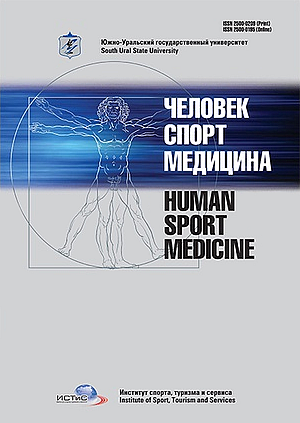ECOLOGIC TECHNOLOGIES IN THE UNIVERSITY STUDENTS’ EDUCATION PROCESS
Keywords:
students, psychophysical self-regulation, mental health, human ecology, appropriate behavior, educational process, relaxation
Abstract
Aim. To justify the effectiveness of the course of “Psychophysiology of Safety” with psychophysical relaxation exercises in the normalization of the psychophysical status in university students. Materials and Methods. The paper presents the data of the research involving social work female students. The research methods included electroencephalography, electrocardiography, survey, and recording of neurodynamic parameters. Results. The influence of psychophysical relaxation exercises on the functional state of the heart and central nervous system (CNS) is analyzed. The positive impact of relaxation on the heart and CNS functions and on the psychoemotional state. Conclusion. The maintenance of harmonious human ecology and improvement of quality of life require the introduction of relaxation technologies into the students’ educational process in order to prevent psychophysical disorders and inappropriate behavior.References
1. Lubysheva L.I., Zagrevskaya A.I. [Integration of Physical and Mental Development of Students on the Basis of Kinesiology Approach to Their Sports and Sports Education]. Fizicheskaya kul'tura: vospitanie, obrazovanie, trenirovka [Physical Culture. Education, Education and Training], 2016, no. 2, pp. 2–6. (in Russ.)
2. Maksutova G.I., Popova T.V. [Psychophysical Exercises in Wellness Programs for University Students]. Teoriya i praktikafizicheskoykul'tury [Theory and Practice of Physical Culture], 2013, no. 1, pp. 30–31. (in Russ.)
3. Moiseev N.N. Universum. Informatsiya. Obshchestvo [Universum. Information. Society]. Moscow, Science Publ., 2001. 252 p.
4. Popova T.V., Kourova O.G. Psikhofiziologiya bezopasnosti (Kak izmenit' sebya) [Security Psychophysiology (How to Change Yourself)]. Chelyabinsk, South Ural St. Univ. Publ., 2009. 78 p.
5. Popova T.V. Samoregulyatsiya funktsional'nykh sostoyaniy [Self-Regulation of Functional States]. Chelyabinsk, South Ural St. Univ. Publ., 2007. 155 p.
6. Reshetnikov M.M. [Mental Health – Modern Trends and Old Challenges]. Natsional'nyy psikhologicheskiy zhurnal [National Psychological Journal], 2015, no. 1(17), pp. 9–15. (in Russ.)
7. Spilberger Ch.D. [Conceptual and Methodological Problems of the Study of Anxiety]. Trevoga i trevozhnost' [Anxiety and Anxiety], 2001, pp. 88–103. (in Russ.)
8. Doskin V.A., Lavrent'eva N.A., Miroshnikov M.P., Sharay V.B. [Test Differentiated Self-Assessment of the Functional State]. Voprosy psikhologii [Questions of Psychology], 1973, no. 6, pp. 141–145. (in Russ.)
9. Chubik M.P. Ekologiya cheloveka. Uchebnoe posobie [Human Ecology. Tutorial]. Tomsk, TPU Publ., 2006. 147 p.
10. Bundzen P., Korotkov K., Unestahl L.-E. Psycho-Dinamic and Bio-Energetic Results of Integrated Mental Training. K. Korotkov (Ed.) Measuring Energy Fields: Current Research. Fair Lawn, USA, Backbone Publishing Co., 2004, pp. 12–23.
11. Szabo A., Hopkinson K.L. Negative Psychological Effects of Watching the News in the Television: Relaxation or Another Intervention May Be Needed to Buffer Them! Int. J. Behav. Med., 2007, vol. 14, рр. 57–62. DOI: 10.1007/BF03004169
2. Maksutova G.I., Popova T.V. [Psychophysical Exercises in Wellness Programs for University Students]. Teoriya i praktikafizicheskoykul'tury [Theory and Practice of Physical Culture], 2013, no. 1, pp. 30–31. (in Russ.)
3. Moiseev N.N. Universum. Informatsiya. Obshchestvo [Universum. Information. Society]. Moscow, Science Publ., 2001. 252 p.
4. Popova T.V., Kourova O.G. Psikhofiziologiya bezopasnosti (Kak izmenit' sebya) [Security Psychophysiology (How to Change Yourself)]. Chelyabinsk, South Ural St. Univ. Publ., 2009. 78 p.
5. Popova T.V. Samoregulyatsiya funktsional'nykh sostoyaniy [Self-Regulation of Functional States]. Chelyabinsk, South Ural St. Univ. Publ., 2007. 155 p.
6. Reshetnikov M.M. [Mental Health – Modern Trends and Old Challenges]. Natsional'nyy psikhologicheskiy zhurnal [National Psychological Journal], 2015, no. 1(17), pp. 9–15. (in Russ.)
7. Spilberger Ch.D. [Conceptual and Methodological Problems of the Study of Anxiety]. Trevoga i trevozhnost' [Anxiety and Anxiety], 2001, pp. 88–103. (in Russ.)
8. Doskin V.A., Lavrent'eva N.A., Miroshnikov M.P., Sharay V.B. [Test Differentiated Self-Assessment of the Functional State]. Voprosy psikhologii [Questions of Psychology], 1973, no. 6, pp. 141–145. (in Russ.)
9. Chubik M.P. Ekologiya cheloveka. Uchebnoe posobie [Human Ecology. Tutorial]. Tomsk, TPU Publ., 2006. 147 p.
10. Bundzen P., Korotkov K., Unestahl L.-E. Psycho-Dinamic and Bio-Energetic Results of Integrated Mental Training. K. Korotkov (Ed.) Measuring Energy Fields: Current Research. Fair Lawn, USA, Backbone Publishing Co., 2004, pp. 12–23.
11. Szabo A., Hopkinson K.L. Negative Psychological Effects of Watching the News in the Television: Relaxation or Another Intervention May Be Needed to Buffer Them! Int. J. Behav. Med., 2007, vol. 14, рр. 57–62. DOI: 10.1007/BF03004169
References on translit
Published
2016-09-01
How to Cite
Kourova, O. (2016). ECOLOGIC TECHNOLOGIES IN THE UNIVERSITY STUDENTS’ EDUCATION PROCESS. Human. Sport. Medicine, 16(3), 87-91. https://doi.org/10.14529/hsm160310
Issue
Section
Brief communications
Copyright (c) 2019 Human. Sport. Medicine

This work is licensed under a Creative Commons Attribution-NonCommercial-NoDerivatives 4.0 International License.















